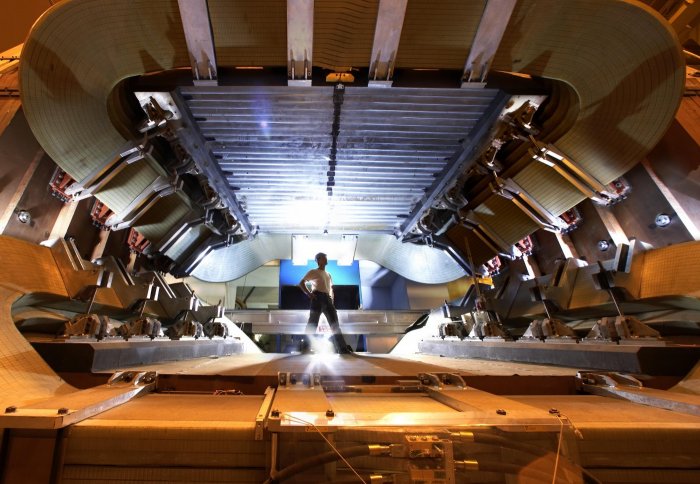New study shows universe is left-handed

LHCb magnet (credit: Peter Grinter, 2008)
The direction in which a particle spins as it decays via a fundamental force shows the universe has a left-handed bias, according to a new study.
Scientists from the LHCb international collaboration at CERN’s Large Hadron Collider, studied the behaviour of a certain particle as it decayed via one of four fundamental forces in the universe, known as weak nuclear force.
The weak nuclear force is responsible for decaying particles. The team wanted to understand how the weak force decays this particle, called the lambda b baryon, into lighter particles.
The team were aiming to find out more about the fundamental behaviour of matter in the universe and even search for new clues about the nature of dark matter, a mysterious substance that scientists only know about because of its gravitational pull.
The ‘handedness’ of the universe is, in combination with differences between matter and antimatter, fundamental for how our universe evolved
– Professor Ulrik Egede
Department of Physics, Imperial College London
The lambda b baryon decays into different particles – a proton, a muon and a neutrino. Within the lambda b are even smaller elements, called quarks. The researchers were interested to see how one particular quark, called the beauty, or b quark, decayed into another type of quark, called an up quark.
The measurements taken by the team, published today in Nature Physics, demonstrated that the decay only takes place when the beauty quark has a ‘left-handed’ spin.
“Our results show that the decay does indeed behave in a left-handed way. The ‘handedness’ of the universe is, in combination with differences between matter and antimatter, fundamental for how our universe evolved,” says Professor Ulrik Egede, from the Department of Physics at Imperial College London. “Because the weak force is the only one of the fundamental forces to distinguish between right and left, we can also say that the Universe has a left-handed bias.”
“Although this left-handedness is predicted by the widely accepted Standard Model of physics, it has also been refuted by some physicists in recent years,” adds Professor Egede,. “We now need to explore other decays to understand why past measurements gave inconsistent results with a purely left-handed decay.”
The team is working within the Large Hadron Collider Beauty experiment (LHCb) which is funded in the UK mainly by the Science and Technology Facilities Council. Its purpose is to investigate the nature and behaviour of beauty quarks and use these observations to try to shed light on some of the universe’s biggest mysteries, including the nature of dark matter.
Scientists had previously suggested that if right-handed quarks were participating in the decay as well, this might indicate that other forces are at work in the universe, besides the four – gravity, electromagnetism, weak and strong nuclear – described in the Standard Model. Investigation of these other forces could yield important clues about dark matter.
This study is important because it shows that any new fundamental force with a right-handed component is not involved in the decay – a setback for physicists searching for these new forces.
Dr Greig Cowan, an LHCb physicist from Edinburgh University and co-author on the paper, said: “Our results show a clear left-handed bias, which pulls us away from this line of enquiry and indicates that we need to look elsewhere to answer these fundamental questions about the universe.”
The team will continue their experiments at CERN to study other types of particle decay to see if evidence of dark matter can be found via other routes.
reference
Article supporters
Article text (excluding photos or graphics) © Imperial College London.
Photos and graphics subject to third party copyright used with permission or © Imperial College London.
Reporter
Laura Gallagher
Communications Division